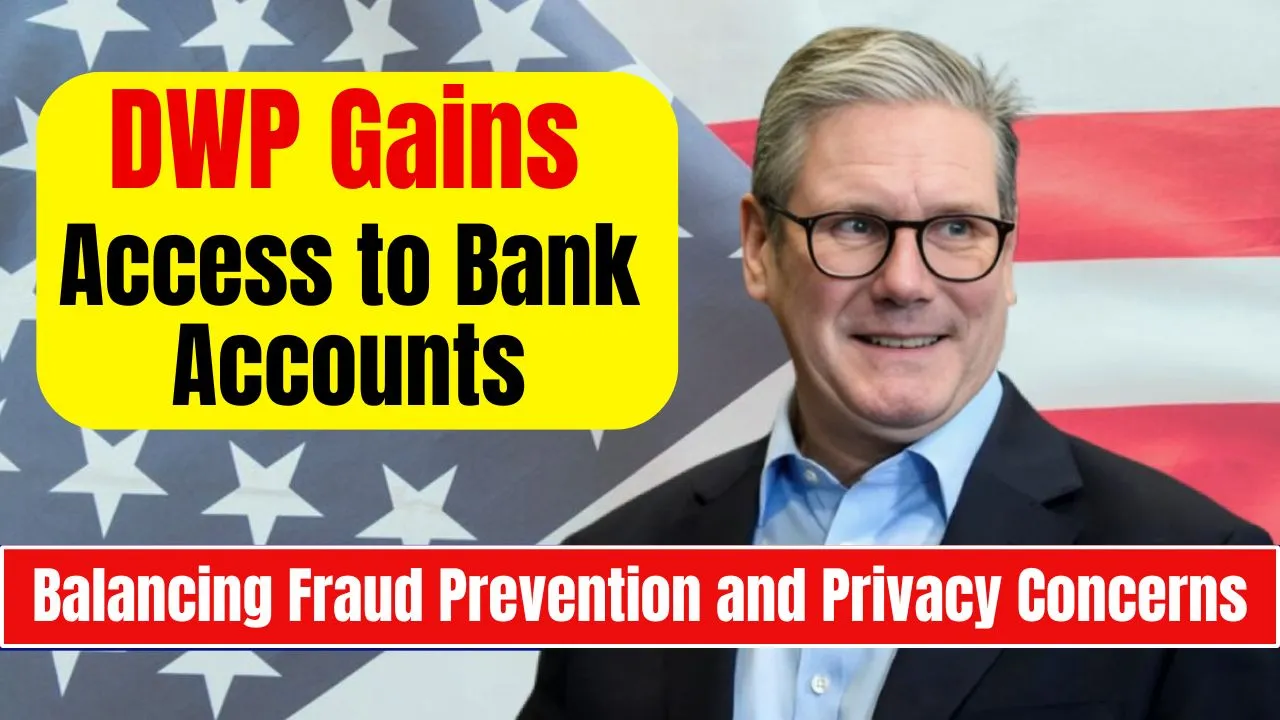DWP Gains Access to Bank Accounts: This article explores the new powers granted to the DWP, the concerns raised by privacy advocates, and the broader implications for welfare claimants and society at large.
The UK government has granted the Department for Work and Pensions (DWP) the authority to access the financial records of welfare claimants, a move that has sparked significant debate. While officials emphasize that this measure is designed to combat welfare fraud and ensure public funds reach those in genuine need, critics warn of potential privacy violations and the disproportionate impact on vulnerable groups.
Overview Table: Key Facts About DWP Access to Bank Accounts
| Aspect | Details |
| Policy Overview | DWP can compel banks to share welfare claimants’ financial data. |
| Objective | Detect and prevent welfare fraud. |
| Target | Claimants suspected of fraud. |
| Privacy Concerns | Mass surveillance, data misuse, and overreach risks. |
| Government Safeguards | Oversight, staff training, and manual reviews. |
What Are the New Powers Granted to the DWP?
The DWP now has the authority to compel banks to disclose financial information about individuals claiming welfare benefits. This policy aims to identify fraudulent claims by verifying the financial activities of claimants and ensuring funds are allocated to those who genuinely qualify.
Key Features:
- Scope: The powers specifically target individuals suspected of committing fraud.
- Verification Process: Financial data will be used to confirm whether claimants meet eligibility criteria.
- Oversight Mechanisms: The government has promised safeguards, including manual reviews by trained staff to prevent misuse.
The Government’s Rationale for the Policy
The UK government justifies the move as a necessary step to protect the integrity of the welfare system. Welfare fraud costs taxpayers millions each year, diverting resources from vulnerable groups who rely on these benefits.
Key Arguments from the DWP:
- Fraud Detection: Ensuring benefits are only provided to eligible individuals.
- Proportional Use: The powers will only be applied when there is reasonable suspicion of fraud.
- Robust Oversight: Transparency mechanisms will prevent misuse of data.
- Human Review: Financial data will not be processed solely through automated systems; all cases will involve manual examination.
According to the DWP, these measures will strengthen public trust in the welfare system while continuing to provide support to those in need.
Privacy Concerns and Criticism
The policy has faced backlash from privacy advocates, civil liberties groups, and concerned citizens who fear potential overreach and misuse of power.
1. Mass Surveillance Risks
Critics argue that allowing government access to private financial records could pave the way for widespread monitoring of citizens, even those not suspected of fraud. This could erode public trust in government institutions.
2. Violation of Personal Privacy
Organizations like Big Brother Watch and Privacy International have raised alarms about the potential intrusion into personal financial data. They argue that such measures could create an environment of constant surveillance, undermining citizens’ sense of security.
3. Impact on Vulnerable Groups
Pensioners, disabled individuals, and carers are among the groups most likely to face undue scrutiny. Critics worry that these individuals could be wrongly targeted, leading to unnecessary stress or loss of benefits.
Role of Privacy Advocates
Privacy groups have actively voiced their concerns about the potential consequences of the DWP’s new powers. Drawing parallels to previous government surveillance initiatives, they emphasize the risks of unchecked authority.
Key Concerns Raised:
- A joint letter signed by advocacy organizations, including Age UK and Disability Rights UK, highlights how similar measures in the past have led to wrongful accusations and harm.
- The Horizon Scandal is often cited as an example, where errors in financial monitoring systems led to false allegations against innocent individuals.
Privacy advocates stress the need for stringent safeguards and oversight to ensure that claimants’ rights are protected.
Balancing Fraud Prevention and Privacy
The debate surrounding DWP access to bank accounts underscores the challenge of balancing two critical priorities: protecting public funds and respecting individual privacy.
Potential Risks of Overreach:
- Setting a Dangerous Precedent: Allowing government access to private financial data could normalize invasive practices across other policy areas.
- Erosion of Trust: Vulnerable groups may become hesitant to claim benefits, fearing undue scrutiny or privacy violations.
Benefits of Fraud Prevention:
- Protecting Resources: Reducing welfare fraud ensures funds are available for those who truly need them.
- Strengthening Public Confidence: Effective fraud detection can reinforce trust in the welfare system’s fairness and integrity.
Mitigating Risks and Ensuring Accountability
To address the concerns raised by privacy advocates and maintain public confidence, the government must implement robust safeguards:
1. Enhanced Transparency
- Publish regular reports detailing how the powers are used, including the number of cases investigated and their outcomes.
2. Strengthened Oversight
- Establish independent bodies to monitor the implementation of these powers and address potential abuses.
3. Public Education Campaigns
- Inform citizens about the purpose of the policy, how their data will be handled, and the safeguards in place to protect their privacy.
4. Accessible Appeals Mechanisms
- Ensure that individuals have clear avenues to challenge decisions or report concerns about data misuse.
FAQs About DWP Access to Bank Accounts
1. What are the new powers granted to the DWP?
The DWP can compel banks to share financial information about welfare claimants suspected of fraud.
2. Why has the UK government introduced these measures?
The measures aim to detect and prevent welfare fraud more effectively, ensuring public funds are directed to those who genuinely qualify.
3. What are the primary privacy concerns?
Critics fear mass surveillance, misuse of financial data, and disproportionate scrutiny of vulnerable groups.
4. Who could be most affected by these powers?
Vulnerable populations, including pensioners, disabled individuals, and carers, may face increased scrutiny.
5. What safeguards has the government promised?
The DWP has pledged oversight, staff training, and manual case reviews to prevent misuse of data and ensure ethical handling.
Conclusion
The DWP’s authority to access welfare claimants’ financial records is a bold step aimed at combating fraud and safeguarding public funds. While the government has promised safeguards to protect claimants’ rights, the policy has sparked valid concerns about privacy, potential overreach, and its impact on vulnerable groups.
Striking the right balance between fraud prevention and individual rights will require transparency, robust oversight, and ongoing public dialogue. Ensuring accountability and protecting privacy must remain central to the implementation of these measures to maintain trust in the welfare system.
As the policy takes effect, monitoring its outcomes and addressing unintended consequences will be critical to achieving its goals without compromising the rights of those it seeks to protect.






